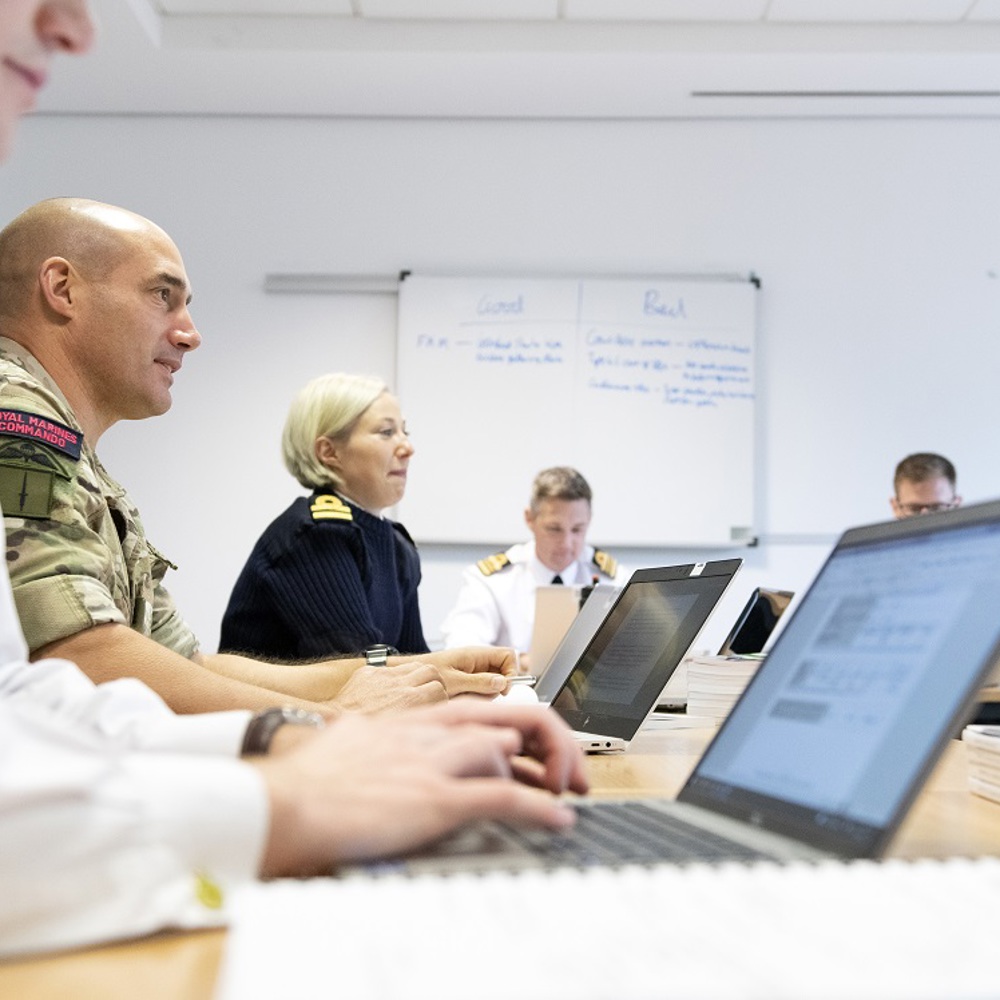Course Information
About this course
Course duration: No part-time MSc will be offered in Sep 26 \ PgDip: up to 20 months part-time and study to be completed by Jul 28 \ PgCert: up to 20 months part-time and study to be completed by Jul 28.
This postgraduate course is delivered by Cranfield University on behalf of the Defence College for Military Capability Integration, at Shrivenham and Cranfield's Bedford Campus.
Today's military aviation platforms are highly complex systems and it is essential these systems, and their related airworthiness risks, are properly understood and managed effectively. To achieve this requires personnel cognisant of a broad range of aerospace engineering disciplines (e.g. mechanical, electrical and system engineering) as well as aviation safety and airworthiness.
The Military Aerospace and Airworthiness (MAA) MSc has been designed to address these needs by providing a course aimed at British military (officers and senior non commissioned officers) and MOD civil servants, especially letter of airworthiness authority holders or those working in the Continuing Airworthiness Management Organisation, Aviation Safety and Release To Service Authority environments, while providing a rich inject of beneficial practice from civil aviation.
The course is delivered on a part-time basis and contains five compulsory modules. Students choose one further module to complete the PgCert or a further seven modules to complete the PgDip (MSc taught phase).
This provides students with the flexibility to tailor their studies to account for prior educational and work experience and the current and future needs of their employment role. The modules taken in the taught phase of the MSc (the PgDip) provide students with the knowledge and skills necessary to complete a research-based project, which forms the final part of the master's award.
Cranfield University's requirement to keep their courses up-to-date and current requires constant innovation and change. The modules they offer reflect the needs of business and industry and the research interests of their staff and, as a result, may change or be withdrawn due to research developments, legislation changes or for a variety of other reasons. Changes may also be designed to improve the student learning experience or to respond to feedback from students, external examiners, accreditation bodies and industrial advisory panels.
The module list detailed below. Modules are indicative only and may be subject to change for your year of entry.
All the modules in the following list need to be taken as part of this course:
Study Skills (non-assessed)
Airworthiness of Military Aircraft
Safety Assessment of Aircraft Systems
A selection of modules from the following list need to be taken as part of this course:
Aircraft Fatigue and Damage Tolerance
Air Transport Engineering – Maintenance Operations
Aircraft Accident Investigation and Response – no web page available but must be undertaken with assessment.
Design Durability and Integrity of Composite Aircraft Structures
Fundamentals of Aircraft Engine Control
Human Factors in Aircraft Maintenance
Uninhabited Aircraft Systems UAS Technology
Military Avionics – STA Communications and Navigation
Introduction to Aircraft Structural Crashworthiness - no web page available but must be undertaken with assessment.
You may also elect to undertake a number of standalone modules as opposed to an MSc, PgDip or PgCert, with or without the associated assessment, less for study skills and the research project. A number can only be taken with assessment; for the most up-to-date information on this, refer to the module web page.
Applications for standalone modules can be made direct to Cranfield University via the web page linked above. In the absence of a web page, request a link to the accredited application form for the module from Cranfield admissions at: cdsadmissionsoffice@cranfield.ac.uk.
How this course will help your career
The course may create opportunities to develop your career at a more senior level and support achieving incorporated or chartered engineer status.
Entry requirements
Who can attend this course
- Military
- MOD civil servants
- Industry
- Internationals
All applicants to courses that are wholly or partially delivered at Shrivenham must complete the BPSS (HMG Baseline Personnel Security Standard V4 April 2014) prior to registration on the course or must already hold a security clearance to this level or higher.
Before you attend
You must have one of the following:
A first or second class honours degree or equivalent in science, engineering or mathematics. Alternatively, a lesser qualification together with appropriate work experience may be acceptable.
Academic Technology Approval Scheme (ATAS) certificate - if you require a visa to study in the UK may need to apply for an ATAS certificate to study this course. Refer to the Cranfield MSc web page via 'Apply now' for further detail.
Additional information
How the course will be taught
- Face-to-face
How you will be assessed
A mix of essays, examinations, individual and group design exercises and for MSc students, a written dissertation research project and viva voce examination,

